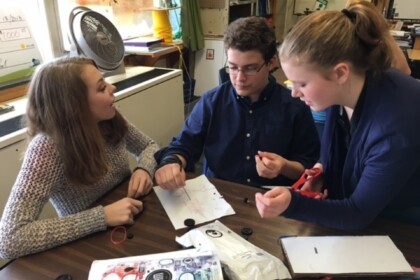
Projects & Materials

A Sprint to Address Human Impact on Global Temperature

Teachers Kristin Tribou, Derrick Zarra, and Abby Smith from Lawrence School in Falmouth were inspired to create the unit as they watched their 8th grade students build solar-powered cars for the Junior Solar Sprint race. They created a unit that tied together the engineering project with a real-world challenge and with related grade-level science standards. The unit doesn’t just delve into global warming, it involves students in doing something about it.
Kristin Tribou introduces the project in her own words here:
As STEM teachers, we have been aware of climate change for some time, but it is easy to forget that some of our students don’t know much about it. This unit opened their eyes to the impact humans have had on our environment.
Just as important, it helped them realize they can help address the challenges ahead. As one of them said, “Change may take a long time, so we should begin soon.”
Our first activity was to watch “An Inconvenient Truth” together. This led to class discussion about global temperature and its impact. The film got them interested in the problems of measuring and interpreting data and understanding linear and nonlinear relationships and provided a context for learning about the carbon cycle and understanding the difference between renewable and nonrenewable sources of energy.
When it came to building their own solar powered cars, students were motivated—not just by the race, but by a sense of altruism. “If we can use clean energy to power cars, we can improve the environment,” one of them told me.
Students also enjoyed the additional challenge of building their cars out of mainly recycled/repurposed materials. They started with nothing but a solar panel, a motor and a set of gears (purchased thanks to a grant from the Falmouth Education Foundation).
In a way, the kids were surprised how hard it was to build a working solar car. But they did a fantastic job of working through the engineering design process, using tools, and teamwork. As I walked around the classroom each day, I heard idea exchange and troubleshooting. I never had to prompt or redirect anyone. They were seriously busy.
As I write this, we’re not there yet, but part of the performance assessment for this unit is for students to create “sales pitches” to present to “Ford Motor Company” (really their classmates and teachers), emphasizing the need for cars that run on alternative sources of energy.
If you would like to see a copy of the unit created by these teachers, please email events@capecodstemnetwork.org and we would be happy to share it with you over email.
This material is based upon work supported by the National Science Foundation under Grant No. 1347610. Any opinions, findings, and conclusions or recommendations expressed in this material are those of the author(s) and do not necessarily reflect the views of the National Science Foundation.